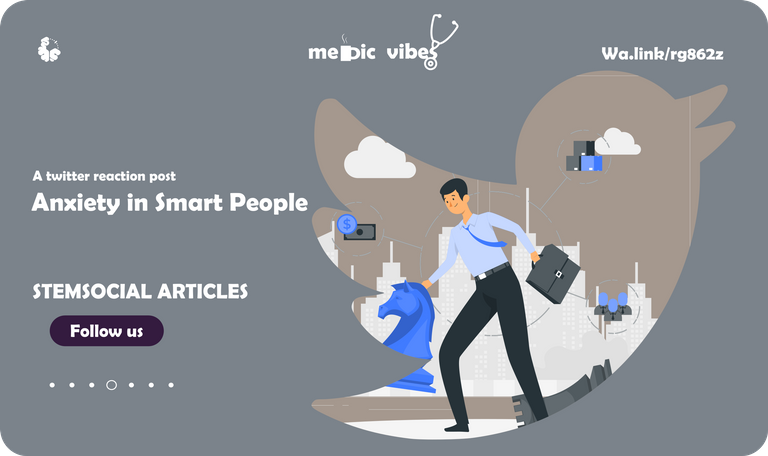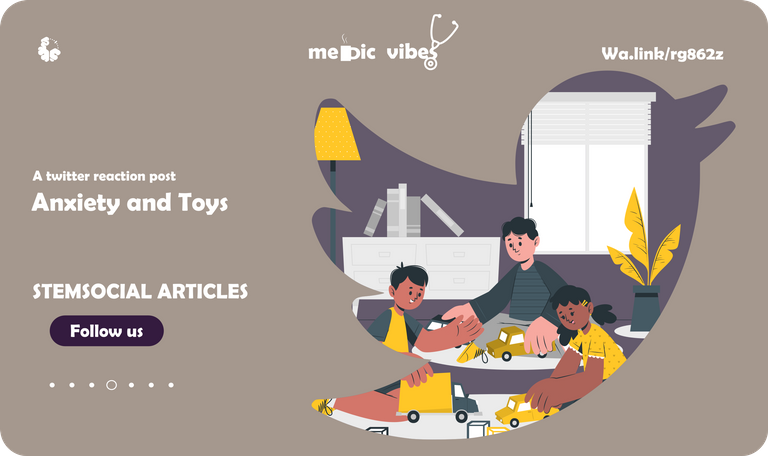Anxiety in Smart People (A Twitter Reaction Post)

Depression vector created by pch.vector - www.freepik.com and Inkscape.org
Smarter people are more likely to suffer from anxiety and depression.
— Fact (@Fact) September 14, 2022
Here is a cool artwork I found
Anxiety Attack #Art by Shintaro Kago pic.twitter.com/IDZE82NXIH
— ⛩ 𝑫𝒆𝒂𝒕𝒉 𝒃𝒚 𝑯𝒊𝒃𝒂𝒄𝒉𝒊 ⛩ (@deathbyhibachi) September 13, 2022
In the last post, We talked about toys for anxiety that we bought by a Twitter user. I did a little research and found that these toys were being endorsed by a Forbs article. That had averts from top to bottom. We tried to find out if these toys hold any value in terms of treating anxiety and what we found is that it is hard to say. What we were able to find was that they help build fine motor skills however, I can’t say if they can be used to treat anxiety.
There are different types of toys (that basically could stimulate every sense organ from touch to taste) but we looked mainly at the fidgeting toy and found that it has some value in taking away the fidgeting in some conditions like Post Traumatic Stress Disorder and Obsessive Compulsive Disorder but it does not treat it. There is also no substantial evidence that fidgeting can take away.
For conditions like Obsessive Compulsive Disorder, we looked at how exposure therapy may be more reliable than the use of fidget toys or toys of any kind. There is more evidence of this.

bought this anti anxiety toy for my son. He loves playing with it and feels relaxed with it. Such a blessing ������ pic.twitter.com/OYYMWVHCkR
— April ��� (@AprilBeaI16) September 12, 2022
In this post, I am going to go through yet another @facts post. I have read this before by the way that smart people go through depression because ignorance is bliss so if you take the opposite of the pole then knowledge should be sadness. But a part of me feels that is not the case. The issue is how many of the world's smartest have been put to this test and how many came out depressed or anxious. Also what kind of anxiety, is it the one with a small “a’ or a big “A” or depression are they discussing, is it depression with a small “d” or a big “D”?
I want to read all the information available on the topic ad give you the best information.
This is the Medic Vibes blog, where we help each other stay current on issues related to mental health. Good day, and I hope you are having a good one. A doctor and an illustrator, @ebingo is the person hosting this blog. Since we currently only have one writer and illustrator, we have not yet switched to our main blog. For the time being, we blog for the STEMsocial community. We discussed depression last month, and this month is all about anxiety. Just like this month, we began last month with a study from Nigeria that revealed a 50% prevalence of anxiety in a youth camp. We began examining Twitter posts after the study last month, and we are currently doing the same.
Mental health conditions known as anxiety disorders make a person feel more frightened and worried than usual. Though most people are susceptible, the younger generation is more likely to be affected by this condition.
For example, a study we looked at revealed that nearly 50% of campers in Northwest Nigeria experienced anxiety. However, only 1% of Nigerians as a whole and about 3% of people worldwide report having anxiety. Women are more likely to experience it.
Everyone has experienced heart palpitations before important tests, presentations, or performances at some point in their lives. What if I told you that some people experience that feeling every day, though? People who suffer from social anxiety disorder worry about what other people will think of them. These are people they might run into on a daily basis, like a boss or a coworker. People will therefore practice avoidance. We examined how social anxiety in people can manifest in phone calls in one of our previous post.
Along with the physical signs mentioned above, there may also be psychological signs like nightmares, insomnia, flashbacks, and others.
Physical, psychological, and reactionary symptoms are all present in anxious people.
Physical manifestations can include chest pain, stomach pain, weakness, rapid breathing, and a rapid heartbeat. These are typically brought on by the sympathetic firing of the autonomic system.
Among the psychological signs of anxiety are insomnia, nightmares, and flashbacks.
One of the reactionary symptoms that can be seen in both post-traumatic stress disorder and social anxiety is avoidance.
The diagnostic and statistical manual states that the root cause of anxiety that persists for more than six months varies from subject to subject. Controlling it can be challenging. Children with anxiety frequently experience physical symptoms like pain, fatigue, jitteriness, and sleep problems, one of which is always present.
Risk Factors
With Anxiety disorders, when it comes to who can suffer from the condition, it is a little bit of genetics and a little bit of the environment.
Being shy, having the inclination to avoid people you do not know, or avoiding certain places are behavioural traits that make a person more likely to deal with anxiety.
In addition, going through traumatic or very stressful events in childhood makes a person more likely to develop anxiety.
If a person has family members who have anxiety disorders, it put the person at risk also.
Some medical conditions also make it more likely that a person has anxiety disorders this include, including heart conditions like arrhythmias, and thyroid gland problems.
Being female in general increases the chances that you may have anxiety, some researchers believe that it is because of the hormonal variations within the monthly menstrual cycle but others believe that higher testosterone levels have a calming effect. Some feel women are less likely to get therapy for anxiety.
Due to the connection between depression and anxiety and the fact that depression raises a person's risk of suicide, it is crucial to keep an eye out for any changes as soon as they manifest.
Anxiety in Smart people

Home illustrations by Storyset
In a post by Psych Central’s Sandra Montijo reviewed by Lori Lawrenz, they tried to explain why this might just be the case.
The title of their blog post made it very clear that there was no mistake about the relationship:
Research Links Anxiety with Higher Intelligence
This is not new knowledge in the world of psychology already known and had done experiments on this as early as 2011.
In that study done in 2018, they found that mood disorders, Attention Deficit Hyperactivity disorders and Autism were more common among people with High IQs.
The study saw that among 3000 people working for an organisation where a high IQ was required, 20% of them had symptoms of anxiety and over a quarter of them had been diagnosed with mood disorders.
A theory of “hyper brain-hyper body” was put forward after a 2011 study showed that people with Generalised anxiety disorder or GAD had High IQ scores.
This theory was put forward after assessing 44 people 26 of which were had GAD and high IQ scores, the others with lower IQ scores.
A 2021 study done to assess emotional intelligence saw that those with higher scores were more likely to have anxiety or depression.
Tips

People illustrations by Storyset
Sometimes part of the reason those with anxiety feel jittery and indecisive is that they find it difficult to make up their minds. When you feel very worried like this it is advisable to try to do what is on your mind. It takes the negative thought and feelings away from the situation. It helps with being present and being n the moment.
Hive stories
Being a newbie on Hive is very difficult but @brujita18 takes that momentum she has and with the anxiety that the pandemic brought she makes it through even while dealing with a medical condition as serious as a stroke. Her post talks about starting Hive from the beginning and working hard to make it home for herself.
Check it out here
Questions
- What did you learn about anxiety?
- What did you learn about people with high IQs?
- What are the studies that confirm the relationship between anxiety and high IQs?
Conclusion
Having a high IQ is associated with anxiety and other mental health disorders. If you are reading this and your IQ is above 130, then you are likely to experience anxiety in your lifetime. Anxiety is common but it is more common in this group
I hope that you learned a lot from this post.
To book me for illustration gigs click Here
Hi.
Is there a reason for using the quote feature for the entire article?
I don't know how that happened...I'll edit it out...thank you
I've fixed it
Yay! 🤗
Your content has been boosted with Ecency Points, by @wolfofnostreet.
Use Ecency daily to boost your growth on platform!
Support Ecency
Vote for new Proposal
Delegate HP and earn more
Thanks @wolfofnostreet
Thank you very much for your mention and for taking into account my writing and experience. Anxiety is an issue that we must keep under control and use it to our benefit. Greetings!
Thanks for your contribution to the STEMsocial community. Feel free to join us on discord to get to know the rest of us!
Please consider delegating to the @stemsocial account (85% of the curation rewards are returned).
You may also include @stemsocial as a beneficiary of the rewards of this post to get a stronger support.